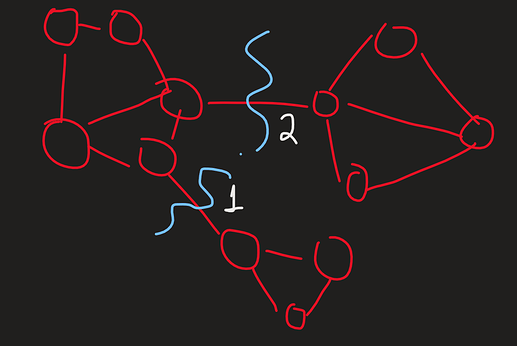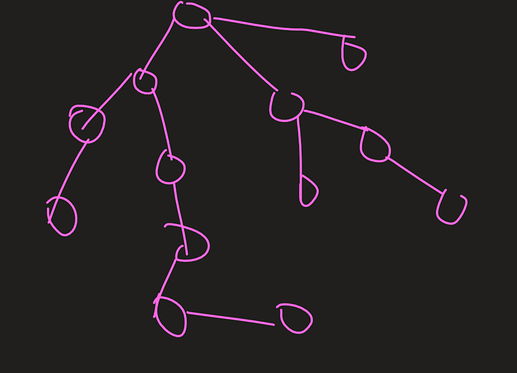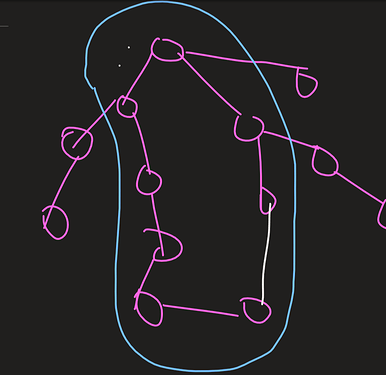PROBLEM LINK:
Practice
Author: (codechefnitj | CodeChef User Profile for Codechef NITJ Chapter | CodeChef)
Editorialist: CodeChefNITJ
DIFFICULTY:
Hard
PREREQUISITES:
dfs, scc, tree, tree diameter
PROBLEM:
Minimizing the number of bridges in a graph by adding an edge
EXPLANATION:
firstly we need to understand what really a bridge is. So any edge in a graph, if removed, increases the total number of connected components.
Example:
here if we remove edge 1 or 2, the total number of connected components increases. Thus, 1 and 2 are bridges.
Now we need to minimize the number of bridges.
So, let us think about the subgraphs between bridges as a single node.
Example:
let us say these marked subgraphs denote a single node and let us convert it into a single node, which can be done using a strongly connected component (SSC).
so, what we get is this:

Now there is a point to notice, that the reduced graph we got above will always remain a tree (for any other set of data).
So, after reducing the graph we got a tree.
Let us take some other examples of the reduced trees as:
here we need to add an edge between two nodes of the tree such that no bridges are reduced. Firstly each edge of the tree (condensed graph) denotes a bridge, and if we connect any two nodes it will form a cycle and the no of reduced bridges will be the length of the cycle - 1. So,
bridgesRemaining = bridgesPresent - maxLengthOfCycle - 1
So, main task left is to find the max length of a cycle.
And, this length will be equal to the diameter of the tree + 1.
So, we are required to find the diameter of tree and our answer will be:
(noOfNodesInCondensedTree-1) - (diameterOfCondensedTree)
TIME COMPLEXITY:
O(n)
SOLUTIONS:
Editorialist's Solution
#include <bits/stdc++.h>
//#include <boost/multiprecision/cpp_int.hpp>
//using namespace boost::multiprecision;
using namespace std;
#define ll long long int
//#define bint cpp_int
#define mod 1000000007
#define REP(i, a, b) for (int i = a; i < b; i++)
#define maxN 100001
//int dx[] = {-2, -1, 1, 2, 2, 1, -1, -2};
//int dy[] = {1, 2, 2, 1, -1, -2, -2, -1};
//int dx[] = {-1, 0, 1, 0, 1, -1, 1, -1};
//int dy[] = {0, -1, 0, 1, -1, -1, 1, 1};
vector<int> arr[maxN], trans[maxN], stConGraph[maxN], tree[maxN], order;
bool vis[maxN];
int label[maxN], sccCnt;
void dfsn(int node = 1, int par = -1)
{
vis[node] = true;
for (int child : arr[node])
{
if (child == par)
{
continue;
}
else if (vis[child])
{
stConGraph[node].push_back(child);
trans[child].push_back(node);
}
else
{
dfsn(child, node);
stConGraph[node].push_back(child);
trans[child].push_back(node);
}
}
}
void dfs0(int node)
{
vis[node] = true;
for (int child : stConGraph[node])
{
if (!vis[child])
{
dfs0(child);
}
}
order.push_back(node);
}
void dfs1(int node)
{
vis[node] = true;
for (int child : trans[node])
{
if (!vis[child])
{
dfs1(child);
}
}
label[node] = sccCnt;
}
int nodeX = -1, dis = 0;
void dfsTree(int node = 0, int par = -1, int dep = 0)
{
if (dis < dep)
{
dis = dep;
nodeX = node;
}
for (int child : tree[node])
{
if (child == par)
continue;
dfsTree(child, node, dep + 1);
}
}
int main(int argc, char const *argv[])
{
ios_base::sync_with_stdio(false);
cin.tie(NULL);
cout.tie(NULL);
int n, m, a, b;
cin >> n >> m;
while (m--)
{
cin >> a >> b;
arr[a].push_back(b);
arr[b].push_back(a);
}
dfsn();
memset(vis, false, maxN);
for (int i = 1; i <= n; i++)
{
if (!vis[i])
{
dfs0(i);
}
}
memset(vis, false, maxN);
for (int i = n - 1; i > -1; i--)
{
if (!vis[order[i]])
{
dfs1(order[i]);
sccCnt++;
}
}
if (sccCnt > 1)
{
REP(node, 1, n + 1)
{
for (int child : arr[node])
{
if (child > node)
{
int a = label[child], b = label[node];
if (a != b)
{
tree[a].push_back(b);
tree[b].push_back(a);
}
}
}
}
dis = 0, nodeX = 0;
dfsTree();
dfsTree(nodeX);
cout << sccCnt - 1 - dis << endl;
}
else
{
cout << 0 << endl;
}
return 0;
}



